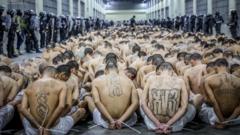In a recent agreement between US Secretary of State Marco Rubio and El Salvador's President Nayib Bukele, a proposal emerged where the US could send both undocumented migrants and American criminals to El Salvador's maximum-security mega-jail. While this arrangement aims to address US immigration issues, it ignites a debate over legality, human rights, and the implications for US citizens and residents.
El Salvador's Mega-Jail Deal: A Controversial Proposal for US Criminals

El Salvador's Mega-Jail Deal: A Controversial Proposal for US Criminals
El Salvador's President Nayib Bukele offers to house US criminals in his country's mega-jail, raising legal and ethical concerns about the implications of such a deal.
The proposal put forth by El Salvador's President Nayib Bukele has stirred concern and dialogue regarding the treatment of criminals and how nations handle the deportation of their citizens. Following a meeting with US Secretary of State Marco Rubio, Bukele claimed that El Salvador would welcome deportees, including US citizens convicted of crimes, to serve their sentences in his new mega-jail facility, known as the Terrorism Confinement Centre (Cecot). This facility opened in early 2023 and has the capacity for around 40,000 inmates, reportedly subjecting them to harsh conditions.
Rubio expressed his enthusiasm about the "unprecedented" deal, underscoring Bukele's willingness to undertake responsibility for inmates, thereby easing the burden on the US. However, the proposal's reception was mixed, with several legal experts highlighting the constitutional challenges associated with deporting US citizens and lawful residents. Current legal frameworks offer significant protections for American citizens, making them immune from deportation unless they are naturalized citizens who may face denaturalization.
Critics of the deal emphasize potential violations of human rights given the prison's controversial reputation. Reports indicate harsh treatment of inmates, including extreme overcrowding and inadequate living conditions. Following a surge in violence attributed to gang activities in El Salvador, Bukele's administration has defended the mega-jail as a necessary measure to combat crime.
As discussions continue, legal experts caution against equating citizenship status with the ability to send individuals overseas for imprisonment. The complexities surrounding natural-born versus naturalized citizenship further complicate the potential enforcement of such an agreement, driving home the importance of a legal safeguard system that currently protects US citizens.
While the move could be viewed as part of a broader strategy to manage criminal gangs like MS-13, it raises pressing ethical questions about the implications for international justice and human rights standards. As the Trump administration explores this dramatic proposal, public reaction remains conflicted, and the future of this agreement remains uncertain.























